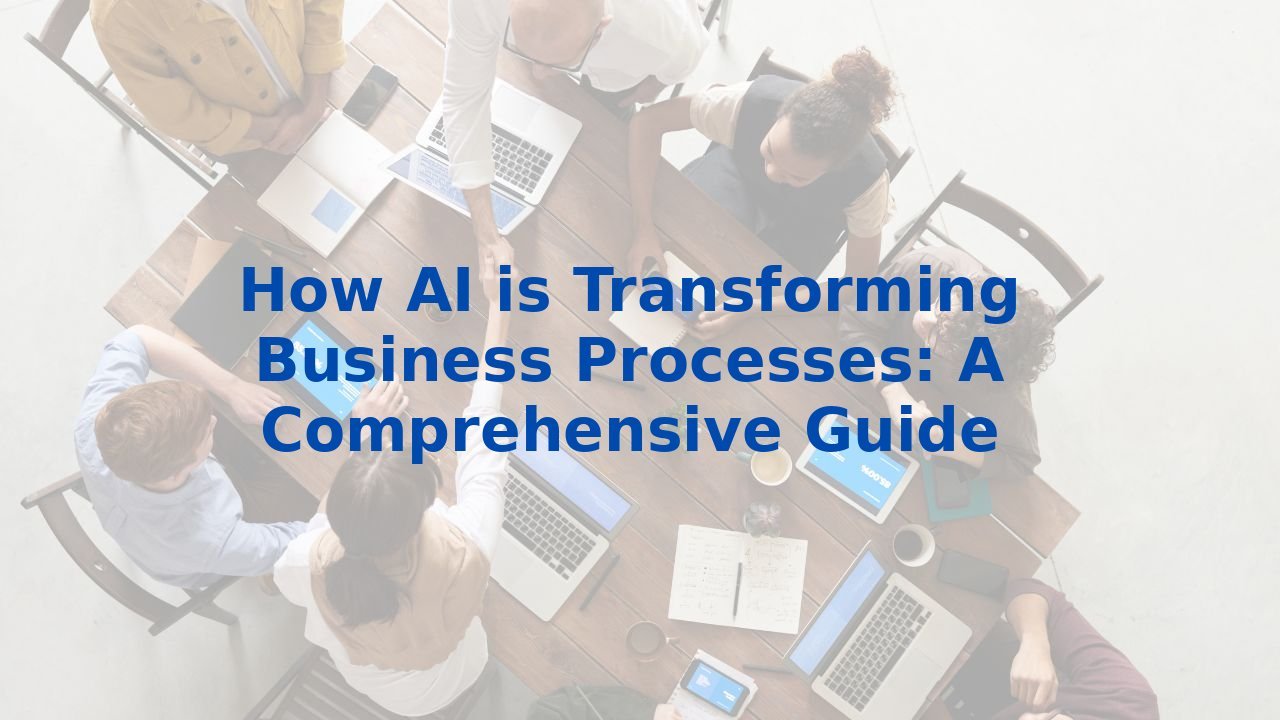How AI is Transforming Business Processes: A Comprehensive Guide
How AI is Transforming Business Processes: A Comprehensive Guide
In an age where time is of the essence, organizations are constantly on the lookout for ways to optimize their operations, cut down on repetitive tasks, and make informed decisions swiftly. Enter artificial intelligence (AI)—a transformative force that is reshaping how businesses operate. Let’s explore how AI enhances key business processes and the myriad benefits it brings, particularly in driving efficiency within organizations.
1. Improving Meetings
Meetings can be a necessary but sometimes tedious aspect of business. The administrative tasks associated with them often drain valuable resources. AI has the potential to alleviate this burden significantly. Imagine automated scheduling and note-taking; tools powered by AI can effortlessly manage appointments, record discussions, and summarize action points. This automation not only saves time but also ensures that crucial insights are not lost in the shuffle, enabling teams to focus on what truly matters: executing strategies that drive goals forward.
2. Enhancing Sales and Marketing
In the realm of sales and marketing, leveraging AI can provide teams with invaluable insights into consumer behavior. Predictive analytics within customer relationship management (CRM) systems empower sales professionals by identifying high-potential leads and optimizing their time allocation effectively. Furthermore, AI-enabled chatbots offer immediate assistance to customers, answering common queries and driving sales without the limitations of human availability. This not only enhances customer satisfaction but also increases revenue generation, showcasing AI's true potential in business growth.
3. Assessing and Improving Customer Service
AI is revolutionizing how organizations assess the quality of their customer service. By automating the evaluation of service interactions, businesses can identify inefficiencies and areas for enhancement swiftly. With the ability to analyze customer feedback accurately, AI serves as a valuable ally in ensuring that service standards are consistently met or exceeded. The insights gathered through these AI-driven assessments can lead to substantial improvements in customer satisfaction—a key factor in maintaining loyalty in today’s competitive market.
4. Improving Product Development Processes
The landscape of product development is changing thanks to AI-driven generative design technologies. By inputting specific goals and requirements, designers can access multiple design alternatives that align with their parameters, streamlining the design process. This remarkable capability not only cuts down on time spent on prototypes but also reduces costs, driving innovation in the process. Organizations can innovate faster while ensuring that they meet market demands effectively.
5. Automating Content Generation
Content creation, whether for marketing or internal documentation, can be a resource-intensive process. AI removes some of this burden by generating high-quality text swiftly. With AI algorithms capable of producing everything from product descriptions to full reports, businesses can significantly accelerate their content strategies. This automation means organizations can focus their creative talents on more strategic initiatives while leaving the repetitive aspects of content generation to AI.
6. Enhancing the Manufacturing Process
Innovation in manufacturing is reaching new heights with the advent of collaborative robots (cobots). Cobots work alongside human employees, taking over mundane tasks and allowing people to focus on more strategic responsibilities. This synergy between humans and machines enhances productivity while optimizing efficiency. Moreover, AI-driven recruitment tools streamline hiring processes, making it easier to identify top talent without compromising on quality—an invaluable asset in an ever-evolving industry.
7. Process Optimization and Automation
AI excels in process optimization by utilizing machine learning technologies to refine routine business operations. This not only encompasses automating repetitive tasks but also utilizes intelligent insights to improve decision-making. With AI analyzing data and identifying patterns, organizations can enhance productivity, reduce operational errors, and create a culture of continuous improvement.
Benefits of AI for Business Process Improvement
- Streamlined Workflows: AI automates mundane tasks, freeing employees to focus on strategic efforts that matter.
- Intelligent Automation: With automation handling routine tasks, businesses can minimize errors and enhance productivity.
- Generative AI for Innovation: This capability sparks creativity within teams, pushing the boundaries of traditional product and service offerings.
- Scalability Across Industries: AI's adaptability ensures that its benefits can be harnessed in various sectors, promoting efficiency and growth.
The Role of Employee Training in AI Implementation
While AI stands to vastly enhance business processes, aligning employee skills with new technologies is crucial. Training the workforce ensures they understand AI's capabilities and limitations, fostering collaboration between human intellect and machine learning. As employees adapt to these technologies, they can respond to changes more fluidly and contribute to continuous improvement within their organizations. Investing in AI training not only equips staff with essential skills but positions the organization as a forward-thinking player in an increasingly digital landscape.
Conclusion
Artificial intelligence is not merely a trend; it’s a transformative force that enhances business processes, improves decision-making, and automates menial tasks. By adopting AI-driven strategies, organizations can streamline operations, elevate productivity, and foster innovation. Furthermore, by ensuring employees are trained in the nuances of AI, companies maximize their return on investment in these technologies, positioning themselves for sustained success in a dynamic market.



